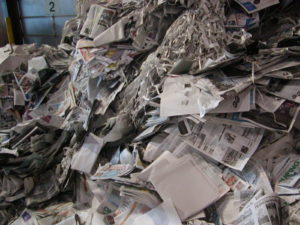As most familiar with the recycling industry know, China is by far the largest consumer of recyclables materials in the world. Their enormous manufacturing base, as well as their expanding desire for consumer products abroad, has created a country that seems to have an endless need for raw materials, including recyclables.
The country’s enormous appetite has created problems, resulting in the importing of undesirable materials that total in the thousands of tons. To address this issue, China’s General Administration of Customs has announced what can be translated in English as “Border-gate Sword 2017” and “National Sword 2017.” The idea behind the use of the word “sword” is applied to how China will be toughening up its borders.
The intention of the program is to reduce and hopefully eliminate illegal smuggling of “foreign waste”, including agricultural products, resource products, tax related goods, drugs, and weapons. Unfortunately, recyclable materials also fall under this category.
How can a country located on the other side of the world dramatically affect the ability to cost-effectively process and market a recycler’s end product?
An ongoing issue and challenge with any recycling operation is to produce clean and marketable end products. Contamination can come in many forms and is defined as any type of “foreign” material other than the intended grades of material. For paper products, these materials can be plastics, wood, or metals. For plastics, this can include paper, wood, dirt, etc.
The National Sword program has thrown a blanket inspection process over all grades of recyclables. Government inspectors working at the port of arrival inspect each container of material, rejecting complete shipments, or containers, should they decide contamination exceeds the acceptable level.
You can imagine the personal cost when you have a shipment of ten to twelve 25 ton containers arrive at a China port – only to be rejected. Rejected material must then be rerouted to another country – if feasible. If not, it is shipped back to the point of origin. Once such company had 160 containers of recyclable paper rejected, and it was sent all the way back to Ireland.
Minimal or eliminated contamination is key to operating any successful recycling operation. Minimizing contamination at the collection point is best, however, there must also be a process in place at any recycling facility to assure its end markets that they are receiving suitable materials that meet inspection criteria, as well as processing requirements.

